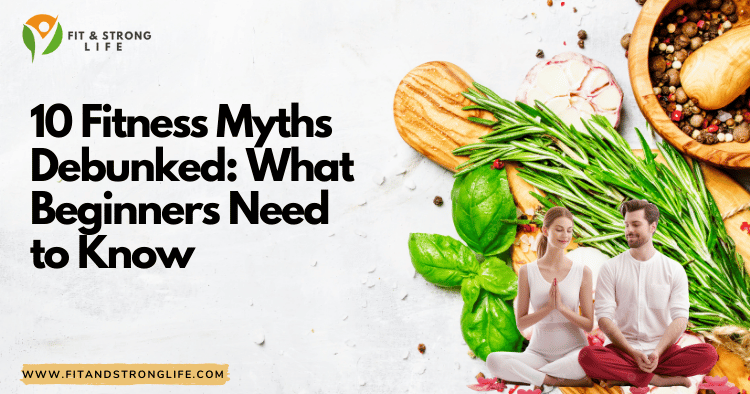Table of Contents
- Introduction
- Myth 1: You Need to Spend Hours in the Gym
- Myth 2: Lifting Weights Will Make You Bulky
- Myth 3: Cardio is the Best Way to Lose Weight
- Myth 4: You Can Spot Reduce Fat
- Myth 5: You Shouldn’t Eat Before a Workout
- Myth 6: You Have to Be Young to Start Exercising
- Myth 7: More Sweat Equals More Calories Burned
- Myth 8: You Have to Do the Same Routine Every Day
- Myth 9: Fitness Supplements Are Essential
- Myth 10: You Can’t Get Fit at Home
- Conclusion
- FAQs
Introduction
In a world overflowing with information (and misinformation), it can be challenging to discern fact from fiction, especially regarding fitness. Many beginners often fall prey to common myths that can hinder their progress and motivation. In this article, we’ll debunk ten prevalent fitness myths, providing you with the essential truths to kickstart your journey towards a healthier lifestyle. Let’s get started!
Myth 1: You Need to Spend Hours in the Gym
Many believe that achieving fitness goals requires hours of sweat and toil in the gym. The truth is, quality trumps quantity. Research shows that engaging in just 30 minutes of moderate exercise most days can yield significant health benefits. Focus on high-intensity workouts or circuit training to maximize efficiency.
Gym Time vs. Results 30 Minutes 60 Minutes Calories Burned 250 500 Muscle Gain Moderate High Fat Loss Yes Yes
For more on effective workouts, check American Heart Association.
Myth 2: Lifting Weights Will Make You Bulky
A common concern, especially among women, is that weightlifting will lead to a bulky physique. In reality, building significant muscle mass requires a specific combination of heavy lifting, a high-calorie diet, and genetics. For most individuals, weight training helps tone muscles and boost metabolism without excessive bulk.
For more insights on strength training for beginners, check Top 7 Strength Training Tips Every Woman Should Know.
Myth 3: Cardio is the Best Way to Lose Weight
While cardio is beneficial for heart health and burning calories, it isn’t the only path to weight loss. Strength training plays a vital role in building muscle, which in turn helps burn more calories at rest. A balanced routine combining both cardio and strength training is optimal for weight loss and overall fitness.
For tips on effective strength training, see 10 Essential Strength Training Tips for Beginners.
Myth 4: You Can Spot Reduce Fat
The idea that you can lose fat in specific areas of your body by targeting them with exercises is a myth. Fat loss occurs uniformly throughout the body and is largely influenced by genetics and overall body composition. A combination of cardio, strength training, and a healthy diet is the key to reducing body fat.
For more on nutrition, see 10 Nutrition Myths Debunked for Optimal Fitness.
Myth 5: You Shouldn’t Eat Before a Workout
Some individuals believe that working out on an empty stomach will maximize fat burn. However, fueling your body with the right nutrients can enhance performance and recovery. A small snack rich in carbohydrates and protein before exercising can improve energy levels and help prevent muscle breakdown.
Pre-Workout Snack Ideas Benefits Banana Quick energy source Greek Yogurt Protein boost Oatmeal Sustained energy
For more detailed nutritional advice, see Top 7 Pre-Workout Foods for Optimal Performance.
Myth 6: You Have to Be Young to Start Exercising
It’s never too late to start exercising! Age should not deter anyone from pursuing a fitness journey. Tailored workouts can be adapted to fit any age group, and many seniors experience significant health improvements from starting an exercise routine. Always consult a physician before beginning any new workout regimen.
For specific tips for seniors, see 7 Essential Strength Training Tips for Seniors to Thrive.
Myth 7: More Sweat Equals More Calories Burned
Sweating is your body’s way of cooling down, and the amount you sweat does not directly correlate with calories burned. Factors like temperature, humidity, and individual physiology play significant roles in perspiration. Focus on the effort and intensity of your workout, not the amount you sweat.
Myth 8: You Have to Do the Same Routine Every Day
Variety is crucial in any fitness program. Doing the same routine can lead to plateaus and boredom. Mix up your workouts with different activities, such as swimming, cycling, or yoga, to keep things fresh and challenging. This variation not only helps prevent burnout but also promotes overall fitness.
For more on workout variety, check 10 Essential Tips for Effective Home Strength Training.
Myth 9: Fitness Supplements Are Essential
While some supplements can aid in nutrition, they are not a necessity for everyone. A balanced diet rich in whole foods typically provides all the nutrients you need to fuel your workouts and recovery. Before starting any supplement, consult with a healthcare provider to ensure it aligns with your dietary needs.
For information on essential supplements, see Top 10 Essential Supplements for Optimal Fitness 2024.
Myth 10: You Can’t Get Fit at Home
With the rise of online workouts and home fitness equipment, getting fit at home is not only possible; it can be incredibly effective! Bodyweight exercises, resistance bands, and dumbbells can provide a full-body workout without needing a gym. The key is consistency and creativity in your routines.
For home workout ideas, see 10 Effective Home Workouts You Can Do at Home.
Conclusion
Navigating the fitness world can be daunting, especially with the myriad of myths that exist. By understanding the truths behind these common misconceptions, you’ll be better equipped to embark on your fitness journey. Remember, it’s about finding what works for you and staying consistent. Happy exercising!
FAQs
Q: How often should beginners work out?
A: Aim for at least 150 minutes of moderate aerobic activity or 75 minutes of vigorous activity each week, along with muscle-strengthening activities on two or more days.
Q: Is diet or exercise more important for weight loss?
A: Both diet and exercise play crucial roles in weight loss. A balanced diet combined with regular physical activity yields the best results.
Q: Can I lose weight without exercising?
A: Yes, but exercise can significantly enhance weight loss efforts and improve overall health. A healthy diet is vital, but adding physical activity can accelerate results.
For more detailed information on fitness strategies, visit CDC’s Physical Activity Guidelines.
Feel free to share this article with anyone who might benefit from clearing up these fitness myths!




